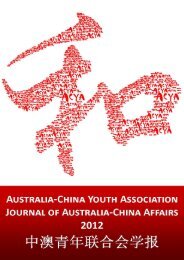a-chinese-stretch-of-the-imagination
a-chinese-stretch-of-the-imagination
a-chinese-stretch-of-the-imagination
Create successful ePaper yourself
Turn your PDF publications into a flip-book with our unique Google optimized e-Paper software.
China Strategy and Debate<br />
This bit <strong>of</strong> history is important because we have to realise that<br />
government has not been in <strong>the</strong> business <strong>of</strong> <strong>the</strong> leadership <strong>of</strong> ideas<br />
about China or <strong>the</strong> rest <strong>of</strong> <strong>the</strong> region now for nearly a decade and<br />
a half. Asia has become a technocratic/ transactional/ economic/<br />
security exercise and not a dynamic engagement driven by ideas<br />
or political understanding or strategic thinking. And <strong>the</strong> longer<br />
this goes on <strong>the</strong> less government wants to debate its policies and<br />
<strong>the</strong> greater <strong>the</strong> risk that governments lose <strong>the</strong> sense <strong>of</strong> strategy<br />
altoge<strong>the</strong>r. As <strong>the</strong> CEO <strong>of</strong> <strong>the</strong> ANZ bank, Mike Smith, said to <strong>the</strong><br />
Australia-China Business Council in July this year, <strong>the</strong>re is what<br />
he politely called a ‘lack <strong>of</strong> attention’ to ‘an over-arching view <strong>of</strong><br />
<strong>the</strong> Australia-China relationship and its long-term health’, and he<br />
called for ‘a return to <strong>the</strong> sense <strong>of</strong> strategy and focus on China that<br />
Australia developed in <strong>the</strong> 1980s and 1990s.’ 6<br />
Mike Smith thought <strong>the</strong> White Paper on <strong>the</strong> Asian Century might<br />
provide some answers. Perhaps. I welcome <strong>the</strong> fact <strong>of</strong> <strong>the</strong> White<br />
Paper, and <strong>the</strong> Prime Minister’s aspirational commitment to<br />
Asia, because <strong>the</strong> signals that come from <strong>the</strong> very top can have<br />
a motivating effect in public life and in <strong>the</strong> community. But,<br />
numbers and statistics aside, almost all <strong>of</strong> it could have been<br />
written a dozen years ago and indeed most <strong>of</strong> it was in one form<br />
or ano<strong>the</strong>r, and some <strong>of</strong> it back in <strong>the</strong> 1980s, and it has taken this<br />
long for this government to catch up. And we’re in hazardous<br />
territory when government itself doesn’t lead with ideas, has no<br />
narrative <strong>of</strong> its own, and outsources <strong>the</strong> thinking to someone else.<br />
If <strong>the</strong>re’s no strong sense <strong>of</strong> <strong>the</strong> ideas and <strong>the</strong> issues on <strong>the</strong> part<br />
<strong>of</strong> <strong>the</strong> political leadership, and no intellectual investment in <strong>the</strong><br />
conceptual part, chances are <strong>the</strong>re won’t be <strong>the</strong> <strong>imagination</strong> or<br />
conviction to carry someone else’s ideas through. We have seen<br />
this happen. How many strategies, for example, relating to Asia in<br />
various forms? How many government declarations <strong>of</strong> support?<br />
But how many times a failure to grasp what this idea is really about,<br />
or even what it takes just to secure foreign language learning in<br />
schools and universities? And how <strong>of</strong>ten a wi<strong>the</strong>ring away <strong>of</strong> <strong>the</strong><br />
state funding, as <strong>the</strong> government’s own Asian Studies Council<br />
wi<strong>the</strong>red away in 1990 when <strong>the</strong> government declined to renew<br />
its mandate? Or looking elsewhere, take <strong>the</strong> fate <strong>of</strong> <strong>the</strong> Henry Tax<br />
这段历史之所以是重要的,是因为我们必须认识到在过去的15年中,<br />
不论是对于中国,还是对于本地区的其它国家,我国政府在观念领导力<br />
方面一向是打马虎眼的。亚洲对我们而言仅限于技术、贸易、经济及安<br />
全等具体层面,对于所有的这一切,全都没有观念领导力,政治理解力<br />
以及战略构想的指引。事实上这种状况延续得越久,政府越懒得进行反<br />
思,于是丧失战略能力的可能性越高。今年7月,澳新银行执行总裁麦<br />
克·史密斯在澳中商会上非常委婉地指出我们对澳中关系和它的长远发<br />
展‘缺少一些大局整体观念’,他因此呼吁‘我们应当回归曾经有过的<br />
对战略构想的重视,以及我们在1980年代到1990年代对中国的高度集中<br />
的注意力’ 6 。<br />
中国战略与争论<br />
麦克·史密斯认为政府的亚洲世纪白皮书多少尚须能够回答一些他所思<br />
考的问题,似乎我也应该对这本白皮书的面世,以及总理对亚洲的重视<br />
而感到高兴,因为来自高层的信号毕竟能够对公众起到一些引领作用。<br />
但是,在其中繁杂的数字和统计之外,白皮书在很大程度上只是旧调重<br />
弹,其中甚至还包含着一些仅是因为政府做事拖拉,直到现在还没有实<br />
施的,早在1980年代就已提出的旧事。我们现在正处于这样一种险恶<br />
处境:政府不能靠理念来领导,也不具有本身的叙事活力,居然把思考<br />
与决策交与让别人越俎代庖。然而,如果政府对理念和政治领导力毫无<br />
清醒认识,而且从不进行智力投资,怎么可能拥有足够的想象力与信心<br />
基础实施别人的理念?而这,已经是我们所面对的现实。针对亚洲的战<br />
略设计不胜其多,政府口头上的支持也不胜其多,但我们根本就没有理<br />
解这些战略背后的理念是什么,甚至连在中学和大学里怎样确保外语教<br />
学课程的开展都没弄明白。此外,政府在很多时候会或者釜底抽薪的举<br />
措,例如政府在1990年宣布停止对它自己批准成立的亚洲理事会的资<br />
12 13



